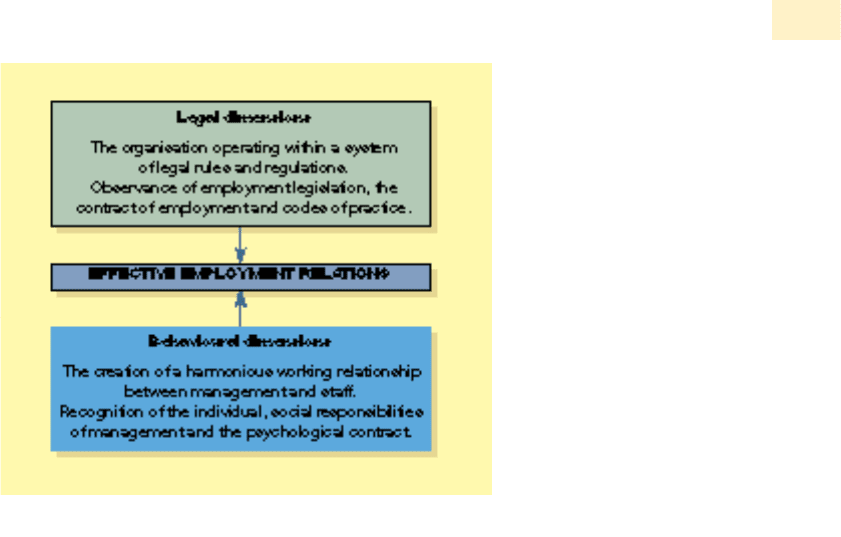Mullins L.J. Management and organisational behaviour, Seventh edition
Подождите немного. Документ загружается.


Traditionally, employee relations in Britain has been characterised by the concept of
free collective bargaining between employees and employers. However, in recent years
this philosophy has been underpinned by increasing amounts of employment law.
63
The
substance of British laws is also increasingly being influenced by the impact of EU legisla-
tion. Until the 1960s the law governing terms and conditions was based almost entirely
on the concept of the contract of employment and attracted little statutory intervention.
However, this area of law has been significantly extended, introducing new statutory
rights for both those in employment and those seeking employment. Employees can
seek redress through a tribunal system, and have rights concerning a range of issues from
relatively minor matters such as time off for public duties, to the more important
employment protection rights such as the right not to be unfairly dismissed.
The main statutory employment rights are now found in two consolidating Acts: the
Employment Rights Act 1996; and the Industrial Tribunals Act 1996 (now called
employment tribunals). Other important legislation includes: Employment Relations
Act 1996; Employment Act 2002; Data Protection Act 1998; Public Disclosure Act 1998;
Human Rights Act 1998; Freedom of Information Act 2000. In addition there is a con-
siderable amount of anti-discrimination legislation affecting employment. The main
acts are: Equal Pay Act 1970 as amended; Sex Discrimination Act 1975 as amended;
Race Relations Acts 1976 and 2000; and Disability Discrimination Act 1995. Age dis-
crimination in employment is also set to be outlawed in 2006.
Important as these acts have been in regulating the employment relationship, two
recent pieces of legislation, the Minimum Wage Act 1998 and Working Time
Regulations, directly affect the central focus of the employment contract. Of particular
significance is the fact that the legislation applies to workers and not just employees,
thus covering those on casual contracts, freelance workers and those employed via
employment agencies.
The introduction of a National Minimum Wage marked a major departure for the
setting of terms and conditions of workers in the UK. In general, prior to its introduc-
tion, pay rates had been set either unilaterally by employers, often on the basis of the
‘market rate’ for the particular occupation, or through the, declining, process of collec-
tive bargaining with recognised trade unions. Under this piece of legislation the United
CHAPTER 19 HUMAN RESOURCE MANAGEMENT
775
Figure 19.7 Effective employment relations: combination of legal and behavioural dimensions
Central focus
of the
employment
contract

Kingdom has, for the first time, statutorily enforceable minimum pay rates for all
workers who are 18 or more years of age. The legislation prescribes two main rates of
hourly pay, one for ‘young workers’ – those between 18 and 21 years of age, and one
for adult workers – those aged 22 and over.
The Working Time Regulations were introduced in order to comply with a
European Union Directive which sought to ensure that workers were given appropriate
rest from work. The details are complex but the principal provisions are:
■ a limit on weekly working time to 48 hours (averaged over a 17-week reference
period);
■ a limit on night workers’ normal working time of eight hours (again averaged over a
17-week period);
■ a minimum daily rest period of 11 hours in addition to a day off each week;
■ a minimum rest break of 20 minutes after six hours’ work;
■ an entitlement to four weeks’ paid annual leave (which can include payment for
bank or public holidays).
These legal provisions, inter alia, set minimum hourly rates of pay, limit weekly maxi-
mum hours of work, and require workers to receive minimum paid holidays. Taken
together, therefore, they have the potential to change the traditional ‘voluntarist’
nature of the employment relationship where employers were free to agree these
important matters either directly with workers or through their workers’ representative
trade union.
The period leading up to the introduction of these two legal measures was charac-
terised by considerable criticism. A number of arguments were put forward suggesting
that they would have a serious impact on jobs and businesses. First, it was argued that
they would lead to increased unemployment as firms sought to absorb the costs of
their introduction by reducing the size of their workforce. Second, that business would
seek to pass on costs by increasing prices, thus causing an increase in the rate of infla-
tion. Third, and more generally, the legislation would make UK companies less
competitive in world markets.
Despite these concerns evidence suggests that the consequences have been limited.
In a study of one low pay sector, the hospitality industry, Adam-Smith et al. suggest that
a number of factors may have lessened the impact of the minimum wage on busi-
nesses. The tightening labour market with the consequential competition amongst
employers for staff has pushed up wage rates and this has had a more significant effect
than minimum wage legislation. They also note that the rates were introduced at a rel-
atively ‘modest’ level and were well publicised in advance of their introduction.
Subsequent increases have been announced with a relatively long lead time. Thus
employers have had time to adjust to the need to increase pay rates.
64
In a similar vein,
Goss and Adam-Smith suggest that the limited impact of the Working Time Regulations
can be attributed to three main factors. First, the provisions on rest and night work are
largely already operated by many businesses. Second, some firms have chosen not to
comply with the requirements, for example, on holiday entitlement. Third, the 48-
hour working week limit can be disregarded if the employer and worker agree in
writing that staff will work longer than this. It appears that many companies have
utilised this ‘opt-out’ to allow long working hours to continue to exist.
65
Behavioural dimensions
Whilst the observance of legal rules and regulations is clearly a necessary part of effec-
tive employment relations this does not, by itself, make for a harmonious environment
at work. Legal dimensions help to regulate the working relationships of people within
776
PART 7 MANAGEMENT OF HUMAN RESOURCES
Impact on
operations and
profitability

the organisation. But rules and regulations do not by themselves ensure that disputes
will be settled amicably. Human behaviour cannot be made to conform to prescribed
rules and regulations just because such rules and regulations exist.
Harmonious employee relations can only be effective if sustained within a generally
good relationship between management and staff, with a willing commitment from both
sides.
66
Effective managers need to take note of both legal and behavioural perspectives,
and to adopt a balanced view when making decisions that affect the employment rela-
tionship. Notwithstanding any legal obligations, the employer–employee relationship
demands that attention be given to those factors which influence the behaviour of
people at work, the psychological contract and the style of managerial behaviour.
For example, there is a general duty placed on an employer to disclose, on request, to
authorised representatives of independent trade unions information for the purposes
of collective bargaining and which it would be good industrial relations practice to
disclose. However, many organisations now consider the broader behavioural consider-
ations and choose as a matter of policy to report fully, and in non-technical terms,
wider details of their financial results and performance direct to all employees.
Another important example is the issue of discipline at work and in particular the
process relating to termination of employment contracts. Managers need to be fully
aware of the legal dimensions, including the criteria necessary before an employee can
claim that they have been unfairly treated, the claims and procedures, the reasons that
can constitute grounds for unfair dismissal proceedings and the remedies for unfair dis-
missal. But, in addition and equally important, managers also need to be aware of the
possible behavioural consequences, including adverse effects on the motivation and
morale of staff, and their future commitment and level of performance.
67
A further example of particular aspects of employee relations policy is the attitude
and response of organisations to people with AIDS. There are a number of factors that
make the issue of HIV/AIDS relevant to the operation of organisational processes.
These may be classified briefly under five headings: the epidemic and those affected;
actual and perceived risks of transmission; the workplace as an arena of discrimination
and prejudice; the workplace as an arena for support and assistance; and work as a
means of economic survival.
68
Another major issue at present is in respect of substance
misuse such as drugs and alcohol.
It is sometimes suggested that in many organisations the responsibility for employ-
ment relations still lies with the line managers who are often sceptical or even hostile
towards personnel ideas and techniques, and who frequently reject the concept of an
employment relations policy because it hampers their work and limits their flexibility.
As with other aspects of the HRM function it is important that line managers are
involved, at least to some extent, with employee relationships. But there must be good
communications and close consultation with the HR department. There must be team-
work and a concerted organisational approach to the management of employment
relations. This is made easier when top management take an active part in fostering
goodwill and co-operation between departments and with official union representa-
tives. Top management should agree clear terms of reference for both the HR manager
and line managers within the framework of sound personnel policies.
69
CHAPTER 19 HUMAN RESOURCE MANAGEMENT
777
Examples
RESPONSIBILITY FOR EMPLOYMENT RELATIONS

The field of international human resource management comprises two distinct areas:
(i) the management of employees in global businesses operating across national
boundaries and (ii) the comparison of human resource management activities and poli-
cies in different societies. Budhwar identifies four approaches to international staffing
which may help to explain how businesses operating across national borders choose to
co-ordinate their human resource management policies.
70
1 Ethnocentric approach. Here managerial positions are normally filled by staff from
the ‘parent’ country. It is likely that within this approach the home country’s
approach will be dominant with subsidiaries operating standardised HRM practices.
2 Polycentric approach. Under this heading local managers from the host country
are more usually appointed. The approach may be useful when a global strategy is to
be implemented on a regional basis. It can also be seen when a subsidiary develops
local HRM practices.
3 Geocentric approach. In this approach managers are recruited from within the
company or from outside with no importance attached to their nationality. It could
be argued that such managers may possess greater cultural flexibility.
4 Regiocentric approach. Recruitment of managers is undertaken on a regional basis.
This is more likely when subsidiaries operate as part of a regional strategy and HRM
practices are, in turn, formulated regionally.
Increasingly, global corporations are both willing and able to adopt a flexible approach
to staffing. A report in the Daily Telegraph in May 2003 examined the shift of call
centre operations from the UK and USA to new locations, in particular the Indian sub-
continent. Identifying specific examples of this phenomenon, the report notes that:
‘Centres in India handle the process of student loans, queries about utility bills for
Powergen and flight bookings for British Airways. A series of other British companies,
including BT, HSBC, Prudential and Aviva, are shifting their call centres to the world’s
biggest democracy.’
This report goes on to suggest that the transfer of jobs may prove to be a worldwide
trend on a scale greater than previously envisaged, citing the example of Standard
Chartered Bank, which has transferred the back office of its operations in more than 50
countries to consolidate in two large processing centres in Chennai, India and Kuala
Lumpur. In indicating the powerful pressures to reconsider global employment pat-
terns the Daily Telegraph article cites the Chairman of a British bank who summarises
his perspective as follows: ‘We have to relocate these functions to India. Not only are
the running costs a fraction of what they would be here, but also the quality of the
workforce is significantly better. Taking advantage of that is a no-brainer.’
71
Comparison of HRM in different societies
Human resource management practices, it is suggested, are influenced by the culture of
the society in which they take place, being affected by both specific culturally derived
attitudes and institutional factors.
To take the one example of recruitment and selection, Torrington suggests that ‘the
recruitment process is largely determined by the conventions and legislative require-
ments of the country in which it takes place’.
72
In examining recruitment and selection
methods in the USA, Francesco and Gold note that ‘when making a hiring decision,
people in an achievement-oriented country consider skills, knowledge and talent’.
73
This individual orientation will influence the selection methods typically chosen in
such a society. Recruitment and selection in the United States has also been significantly
affected by the relatively extensive laws prohibiting discrimination in employment,
778
PART 7 MANAGEMENT OF HUMAN RESOURCES
INTERNATIONAL DIMENSIONS OF HRM

which can, in turn, be seen as an expression of a culture which places particular value
on individual characteristics. It is also possible to view the largely American-derived bat-
tery of psychometric measures within this overall cultural framework.
It may also be that culturally based perceptions take effect in recruitment and selec-
tion in individual cultures. An executive from the Swedish company IKEA, cited in
Schneider and Barsoux, provides one example of a culturally specific preference in this
regard in the following quote. ‘The most important quality for an Ikean is odmjukhet –
a Swedish word that implies humility, modesty and respect for one’s fellow man. It
may be hard to translate, but we know it when we see it.’
74
Grahl and Teague attempt to explain differences in the area of human resource man-
agement between countries in Europe with reference to a model contrasting
competitive and constructive flexibility along a continuum.
75
Competitive flexibility as a concept states that national competitiveness may best
be achieved by minimising restrictions on managerial prerogative – that is, implying a
minimal level of legislation and the removal of barriers to workforce flexibility. This
approach may be compared to some of the features of HRM as it evolved in the United
States. In Europe, Grahl and Teague suggest that the UK is the country which is located
furthest at the competitive end of their model.
Constructive flexibility in contrast, while acknowledging the need for greater flexi-
bility in all its dimensions – numerical, temporal and functional – aims to move
towards this desired aim without exacerbating divisions within society. Here work
employees may enjoy extensive legal rights and protection and social costs to employ-
ers may be greater than in countries more closely associated with competitive
flexibility. Constructive flexibility also presumes a social partnership model of co-
operation within the enterprise whereby managers are required to consult with
employee representatives before making decisions or conceivably to act jointly in con-
junction with these representatives. Grahl and Teague find Germany and Sweden to be
the two European countries most closely corresponding to constructive flexibilty.
It is appropriate at this point to examine the concept of statutory industrial democracy
which is prevalent in many European countries. This will be of benefit to organisations
contemplating expansion into the overseas market. It may also be noted that increas-
ingly the European Union is seeking to harmonise employment practices among
member states, and the whole notion of joint decision-making is already established in
the majority of countries in western Europe.
76
The German system of industrial democracy is the most comprehensive and has
tended to be used by commentators as a model of its kind. The system comprises both
the works council (Betriebsrat), and representation on boards of directors, the super-
visory board (Aufsichtsrat) and the executive board (Vorstand).
77
Works councils exist in organisations covering all sectors of the economy including
both the private and public sector. Works council representatives are elected by fellow
workers. They do not, however, stand on behalf of trade unions, and in elections stress
their individual qualities and experiences. The works council has three rights:
■ the right of information – the works council has the right to be given information
concerning the performance and future prospects of the organisation;
CHAPTER 19 HUMAN RESOURCE MANAGEMENT
779
INDUSTRIAL DEMOCRACY IN EUROPEAN COUNTRIES
THE GERMAN SYSTEM
The works
council

780
PART 7 MANAGEMENT OF HUMAN RESOURCES
■ the right of consultation – owners and managers must consult the works council
over a range of strategic matters including investment, and the acquisition of new
premises and the closure of existing units; and
■ the right of co-determination – the works council has the power to formulate cer-
tain policies jointly with managers.
The third and most extensive power relates essentially to issues concerning the man-
agement of personnel including the working day, holiday arrangements, shift working,
promotion, dismissal, and welfare and social facilities. As an example, the works coun-
cil has the right to participate in the selection of new members of staff and can veto
appointments. This power of veto is constrained, however, since it can only operate in
the light of criteria agreed in advance. Nevertheless, the works council does take an
active part in personnel management in German organisations.
The supervisory board may include employee representatives. In certain industries
such as coal, iron and steel, workers make up 50 per cent of the membership of the
board. In other sectors, one-third membership is common. The supervisory board has
the power to appoint members of the executive board and can veto its decisions.
The composition of the executive board is most interesting in German organisations
since it includes a labour director (Arbeitsdirektor). The labour director can only be
appointed by a two-thirds majority of the worker representatives on the supervisory
board. French shows how this director may be a worker representative, but equally may
be a career personnel manager.
78
Lawrence suggests that increasingly personnel man-
agers are labour directors and are thus represented on both boards of directors.
79
It can be seen that in Germany, personnel managers are constrained by law from
acting unilaterally, and are required to work jointly with the workforce representatives.
Lawrence concludes that the personnel function in Germany is marked by a high
degree of both legalism and formalism with laws, documents and written agreements
being more salient than in Britain. The same author gives us a sense of the flavour of
personnel management in that country as follows:
The works council is an important reference point for the German personnel manager and much
of his time is spent in negotiation or discussion with the council.
80
The ultimate measure of the effectiveness of the HRM function is the contribution it
makes to meeting the objectives of the business and to improved organisational per-
formance. But achievement in the area of HRM is difficult to measure and it is not easy
to establish satisfactory methods of assessment. There is also the more general problem
of assessing managerial work where the end-product results from the efforts of other
people.
81
Cost is obviously a consideration but should not be viewed in isolation. Not
every activity in the organisation can be identified clearly as making a direct contribu-
tion to profitability. A balance should be maintained between the more easily
identified financial costs of the HRM function and the less readily apparent but very
important long-term benefits which also make a positive contribution to the effective-
ness of the organisation.
For example, Pfeffer points out that a major problem with measurements of HR is that
they often use measures produced by the organisation’s accounting systems and focus
attention on what is most easily measured, for example costs of operating the HRM
function or number of people processed through the recruitment process. However,
such measures do not tell exactly what is being done with the resources or if the money
Representation
on boards of
directors
Negotiation
and discussion
EFFECTIVENESS OF THE HRM FUNCTION

is spent wisely. They measure specific parts of the organisation and the time span of
many of the measures is extremely short term. Pfeffer challenges the idea that HR prac-
tices should be justified against ‘bottom-line’ cost-versus-benefit measures. These tend
to measure too many things to be effective in influencing individual behaviour.
82
The contributions from an effective HRM function are not always readily apparent
nor are they necessarily easy to identify. Account should be taken of intangible benefits
such as the morale and job satisfaction of staff as well as their attitudes, behaviour and
performance. Over a period of time, however, some quantified measures may serve to
provide management with an indication of effectiveness. Possible examples include
staffing costs, turnover and stability indexes; promotions and staff development; errors
in work; levels of absenteeism and sickness, timekeeping, accidents at work; the
number of discipline or grievance hearings, dismissals, labour disputes, employment
tribunal cases; complaints from suppliers or customers.
Good HR policies and employment relations
According to Slater: ‘Recognition that employees form the lifeblood of a company has
highlighted the strategic role that the human resources department should now play.’
For the first time HR professionals have the opportunity to add value to a business.
There is a shift in emphasis in business and the bottom line is no longer all-important.
Greater attention is placed on issues such as how well a company executes its business
plan, employee morale, corporate culture and organisational structure. Although the
customer is still king, companies realise that it is their employees who deliver the per-
formance of value to the customer.
Nowhere has this change impacted more greatly than in human resources. The need to focus
more on internal ‘customers’ has put pressure on companies to release HR staff from a largely
administrative role to a more strategic one that addresses increased productivity, employee com-
mitment and career advancement. Only by addressing these issues will a company truly be able
to leverage employee power … Freed from many routine tasks, the HR department will be able to
devote more time to adding value to the business.
83
However the HRM function is organised or evaluated, proper attention to the establish-
ment of good HR policies and employment relations will help to improve the
efficiency of the workforce and standards of service to customers. Full use should be
made of specialist HR staff, the involvement of line managers and modern methods
and processes.
Browning, for example, lists ten ways to make HR effective:
1 Be the catalyst for making things happen.
2Avoid being the corporate soft touch.
3 Understand the whole business.
4 Keep people-management systems simple.
5 Remember line managers manage people, not HR.
6Work with, not above, line managers.
7 Be super-efficient in the transactional stuff.
8 Be leaders in the transformational stuff.
9 Help the business to manage change.
10 Accept that good ‘people ideas’ exist outside HR.
84
CHAPTER 19 HUMAN RESOURCE MANAGEMENT
781

■ An essential part of the process of management is that proper attention be given to
the efficient use of resources, in particular human resources. In recent years there has
been an increasing tendency to use the term ‘human resource management’ (HRM) to
replace ‘personnel management’. Whatever the choice of terminology, it is people who
are the most important asset of any organisation. Effective HRM and the successful
implementation of personnel activities are essential ingredients of improved organisa-
tion improvement.
■ Success in the field of human relationships stems from good HRM policies and prac-
tices which should be based on underlying philosophies of managerial behaviour and
employee relations. The range and scope of HRM activities are wide, and a shared respon-
sibility among top management, line managers and supervisors, and the HR manager. As
an element function, HRM is part of the generality of management and part of the
responsibility of all managers and supervisors. The personnel function can be seen as
operating at two levels, the organisational level and the departmental or unit level.
■ One major area of HRM work of particular relevance to the effective management
and use of people is training and development. Training is a key element of improved
performance and offers a number of potential benefits for both the individual and the
organisation. Too often, however, training is seen as a low-priority activity. In order to
secure the full benefits of training there must be a planned and systematic approach to
the effective management of training, and a continuous commitment to training stan-
782
PART 7 MANAGEMENT OF HUMAN RESOURCES
CRITICAL REFLECTIONS
‘Why is my job as human resource manager not given the full recognition it deserves, and why do
other managers question the contribution of the HR department to the organisation?’
‘Because there is no clearly defined role or focus. You may have changed names from person-
nel but until you can produce hard performance measures for your department, is it any wonder
line managers are sceptical and suspicious of your true value to the organisation?’
What are your own views?
Human resource inputs are obviously key to organisational success, as without people there can
be no organisational activity. Despite hierarchical definitions of roles and responsibilities within
organisations, which differentiate employer and employee, manager and worker, all make funda-
mental contributions to the organisation’s activity through their efforts. These efforts must be as
effective and efficient as possible in order for operational costs to be minimised, while outputs
and profits are maximised.
Capon, C. Understanding Organisational Context: inside and outside organisations, Second edition, Financial Times
Prentice Hall (2004), p. 8.
How would you attempt to secure the optimum contribution and effort from all people
within a hierarchically structured organisation?
‘Having a separate HR department only leads to poor line managers abdicating responsibility for
their people.’
Debate.
SYNOPSIS

dards. Investors in People provides a national framework for training and development
of people to achieve business goals.
■ One way to review the performance and potential of staff is through a formal
appraisal system. An effective performance appraisal system offers a number of poten-
tial benefits to both individuals and the organisation but there are a number of
important questions to be addressed. Consideration must be given to the design and
implementation of the system, establishing the system, methods of appraisals and
potential problem areas. It is particularly important that a formal appraisal system does
not detract from the manager’s responsibility for reviewing performance on a day-to-
day basis.
■ Sound HRM policies help to foster good employment relations. It is necessary to
take account of the institutions and parties involved, and their ideologies and motives.
Good managerial strategies are important for effective employment relations which are
founded on a combination of legal and behavioural dimensions. There are two major
and contrasting perspectives of work organisations, and the explanation and outcomes
of conflict – the unitary and the pluralistic perspectives. These contrasting views influ-
ence the nature of employee relationships and the management of human resources.
■ It is important that line managers are involved, at least to some extent, with the
responsibility for employee relations. Proper attention to the HRM function and
employee relations will help the development of good human relations at work. HRM
practices are influenced by the culture of the society in which they take place.
Increasingly the European Union is seeking to harmonise employment practices
among member states. The ultimate measure of effectiveness of the HRM function is
the contribution to improved organisational performance.
CHAPTER 19 HUMAN RESOURCE MANAGEMENT
783
MANAGEMENT IN ACTION 19.1
The Investors in People Standard
Investors in People is the national Standard which sets a level
of good practice for training and development of people to
achieve business goals. The Standard was developed during
1990 by the National Training Task Force in partnership with
leading national business, personnel, professional and
employee organisations such as the Confederation of British
Industry (CBI), Trades Union Congress (TUC) and the Institute
of Personnel and Development (IPD). The work was sup-
ported by the Employment Department. The experiences of
the UK's most successful organisations, large and small, rep-
resenting all sectors of the UK economy, were very positive
and the Standard received the full endorsement of the wide
range of interested parties.
The Standard provides a national framework for improving
business performance and competitiveness, through a
planned approach to setting and communicating business
objectives and developing people to meet these objectives.
The result is that what people can do and are motivated to do
matches what the organisation needs them to do. The
process is cyclical and should engender the culture of contin-
uous improvement.
The Investors in People Standard is based on four key
principles:
■ Commitment
Commitment to invest in people to achieve business
goals.
■ Planning
Planning how skills, individuals and teams are to be devel-
oped to achieve these goals.
■ Action
Taking action to develop and use necessary skills in a
well-defined and continuing programme directly tied to
business objectives.
■ Evaluating
Evaluating outcomes of training and development for indi-
viduals’ progress towards goals, the value achieved and
future needs.
These four key principles are a cyclical process and are broken
down into 12 indicators, against which organisations wishing to
be recognised as an ‘Investor in People’ will be assessed.

784
PART 7 MANAGEMENT OF HUMAN RESOURCES
ACHIEVING THE STANDARD
Being recognised as an ‘Investor in People’ involves a
number of steps:
■ Understanding the Standard and its strategic implications
for your organisation.
■ Undertaking a review against the Standard to identify any
gaps in current practice.
■ Making the commitment to meet the Standard and com-
municating that commitment to all members of staff.
■ Planning and taking action, to bring about change.
■ Bringing together the evidence for assessment against the
Standard.
■ Achievement or recognition as an Investor in People.
Management in Action 19.1 continued
Principles Indicators Evidence
Commitment 1 The organisation is committed Top management can describe strategies that they have
An Investor in People to supporting the development put in place to support the development of people in
is fully committed to of its people. order to improve the organisation’s performance.
developing its people Managers can describe specific actions that they
in order to achieve its have taken and are currently taking to support the
aims and objectives. development of people.
People can confirm that the specific strategies and
actions described by top management and managers
take place.
People believe the organisation is genuinely committed
to supporting their development.
2 People are encouraged to People can give examples of how they have been
improve their own and other encouraged to improve their own performance.
people’s performance. People can give examples of how they have been
encouraged to improve other people’s performance.
3 People believe their People can describe how their contribution to the
contribution to the organisation organisation is recognised.
is recognised. People believe that their contribution to the organisation
is recognised.
People receive appropriate and constructive feedback
on a timely and regular basis.
4 The organisation is committed Top management can describe strategies that they
to ensuring equality of have put in place to ensure equality of opportunity in the
opportunity in the development development of people.
of its people. Managers can describe specific actions that they have
taken and are currently taking to ensure equality of
opportunity in the development of people.
People confirm that the specific strategies and actions
described by top management and managers take place
and recognise the needs of different groups.
People believe the organisation is genuinely committed
to ensuring equality of opportunity in the development of
people.
Planning 5 The organisation has a plan The organisation has a plan with clear aims and objectives.
An Investor in People is with clear aims and objectives People can consistently explain the aims and objectives
clear about its aims and which are understood by of the organisation at a level appropriate to their role.
its objectives and what everyone. Representative groups are consulted about the
its people need to do organisation’s aims and objectives.
to achieve them.
The Investors in People Standard
